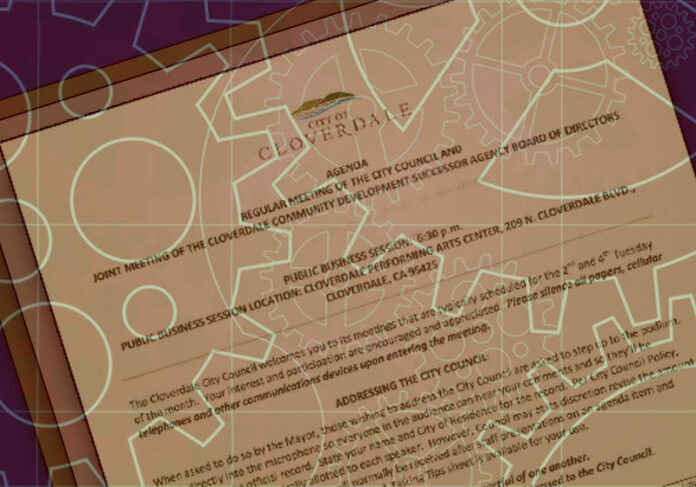The Cloverdale City Council is tackling a small agenda at its meeting this week on Wednesday, Sept. 8. The council will be holding a public hearing to amend the Cloverdale Municipal Code to establish regulation on wireless telecommunication facilities and, as regular business items, will consider adopting a funding agreement with the Cloverdale Chamber of Commerce for the 2021-22 year. The council will also be giving direction on who to appoint as the voting delegate for the California League of Cities’ annual conference and will be approving the maximum allowable solid waste, composting and recycling rates per the city’s agreement with Recology.
The meeting begins at 6 p.m. and will be held in-person at the Cloverdale Performing Arts Center (masks required) and over Zoom. To view meeting information and get the Zoom login, view the agenda here.
Funds for the Chamber of Commerce
Every year, the city gives the Cloverdale Chamber of Commerce money to help support its efforts to boost the city’s economic well-being, tourism, business activity and general community development. In addition to its business efforts, the Cloverdale chamber has helped support and maintain a website for the city’s Resilient Cloverdale emergency preparedness efforts.
As part of its agreement with the city for the 2021-22 year, the council will discuss and possibly approve $75,000 to go toward the Cloverdale Chamber of Commerce — an amount that’s already included in the city’s budget, per the council agenda item.
The amount equals around 60% of the Cloverdale Chamber of Commerce’s overall operating cost ($124,670), and the rest of the dollars the chamber gets from local grants, membership dues and some community fundraisers.
Per the council agenda, the agreement states that the chamber will continue to maintain and staff its office space, keep and maintain its website current, provide services to local businesses, regularly report to the city council on its efforts, continue its business and economic outreach, continue and expand efforts surrounding Resilient Cloverdale and Cloverdale Ready, among other things.
Garbage Rates
As part of its agreement with Recology, each year the city council approves the maximum allowable solid waste collection rates for the following 12 months. Since the past year’s maximum allowable rates were approved on Sept. 23, 2021, the adjustment is back for potential council approval.
Recology’s annual rate increase request — split into five different components and then added together to calculate each customer rate — was submitted to the city and reviewed by R3 Consulting Group.
According to the council agenda packet, the customer rates proposed by Recology effective Sept. 1, 2021 result in the following percentage increases over current rates:
• Residential Carts – RRI Increases of between 1.70% and 3.22% (depending on size of cart).
o The total monthly adjustments range from $0.65 to $0.97 per month
• Commercial Carts – RRI Increases of between 1.26% and 2.12% (depending on size).
o The total monthly adjustments range from $0.78 to $1.35 per month.
• Commercial Bins – Rate Increases of between 0.61% and 0.91% (depending on size and collection
frequency).
o The total monthly adjustments range from $1.93 to $3.42 per month.
Public Hearing: Wireless telecommunications
After a February city council discussion about establishing regulations for wireless telecommunication facilities, city staff put together a draft ordinance that’s now going before the council for a public hearing and potential adoption.
The city’s current telecommunications ordinance doesn’t address small cell facilities — meant to support 5G — which weren’t in use when the ordinance was adopted in 1997.
Small cell facilities are often antennas about 3-4 feet tall that are placed on existing infrastructure and are accompanied by equipment cabinets lower on the pole.
According to the council agenda, the proposed ordinance includes the following components:
• Permit Required- Placement of a Micro Wireless Facility requires a Use Permit approved by the Planning Commission, appeals heard by the City Council.
• Small Cell antennas could be located on public facilities like light poles.
• Design Guidelines- the ordinance contains provisions for screening, least visible antennas,
landscaping where appropriate, no signage or lighting, noise, security, accessory equipment
• Contains a hierarchy of preferred Zoning:
1. Commercial (O-R District less preferred)
2. Industrial
3. Public (City-owned)
4. Residential
• Each pole-mounted wireless telecommunications facility must be separated by at least 1,500 feet.
• Radio Frequency (RF) studies required with the application, must be renewed after 5 years.
• Provides findings for permit approval.








